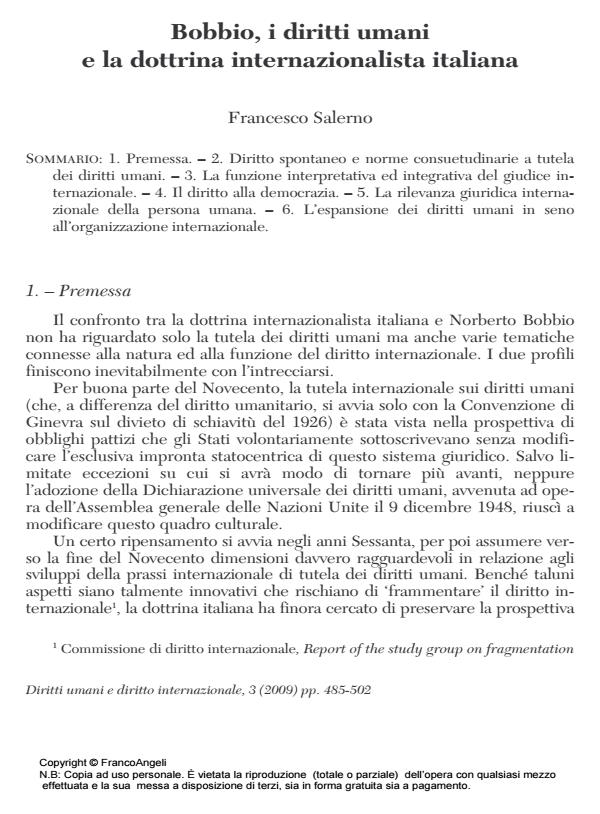Bobbio, i diritti umani e la dottrina internazionalista italiana
Journal title DIRITTI UMANI E DIRITTO INTERNAZIONALE
Author/s Francesco Salerno
Publishing Year 2009 Issue 2009/3
Language Italian Pages 18 P. 485-502 File size 351 KB
DOI 10.3280/DUDI2009-003003
DOI is like a bar code for intellectual property: to have more infomation
click here
Below, you can see the article first page
If you want to buy this article in PDF format, you can do it, following the instructions to buy download credits

FrancoAngeli is member of Publishers International Linking Association, Inc (PILA), a not-for-profit association which run the CrossRef service enabling links to and from online scholarly content.
Bobbio, human rights and Italian doctrine of international law - Two elements must be taken into account in order to assess Bobbio’s influence on Italian legal thinking regarding human rights and their protection at the international level: on one side, Bobbio’s polyedric attitude towards legal studies; on the other side, the difficulty experienced by the Italian doctrine of international law in moving away from traditional positivist and statalist paradigms. The "dialogue" between Bobbio and international legal thinking probably reached its peak in the middle of the 20th Century, when some international law scholars, referring inter alia to Bobbio’s reflection on custom as a source of law, developed the idea of "spontaneous law" in connection with international customary rules. Yet, this "contact" had only a limited impact on the law of human rights, probably due to the fact that, for a long time, Italian scholars have generally followed a very cautious approach over the possibility of ascertaining the existence of universal rules for the protection of such rights. Besides, the Italian doctrine of international law, in line with its formalistic and statalist foundations, paid in general little attention to the "promotional" function of international law in the area of human rights, despite Bobbio’s attempts to draw the attention to its potentials, especially after the adoption of the Universal Declaration of Human Rights(1948). Italian scholars, assuming that international relations and international law should be looked at from the standpoint of the "constitutional sovereignty" of the State, have also been generally unwilling to study the impact of international rules over issues of constitutional law and to assess whether international law requires States to adopt an institutional and legal framework compatible with the "right to democracy". Instead, Bobbio’s attention to federalism has proved to be more easy to share among international law scholars, especially in connection with international organizations acquiring a supra-national dimension: the need of assuring respect of human rights within such organizations, just like at State level, has been constantly remarked by Italian authors.
Francesco Salerno, Bobbio, i diritti umani e la dottrina internazionalista italiana in "DIRITTI UMANI E DIRITTO INTERNAZIONALE" 3/2009, pp 485-502, DOI: 10.3280/DUDI2009-003003